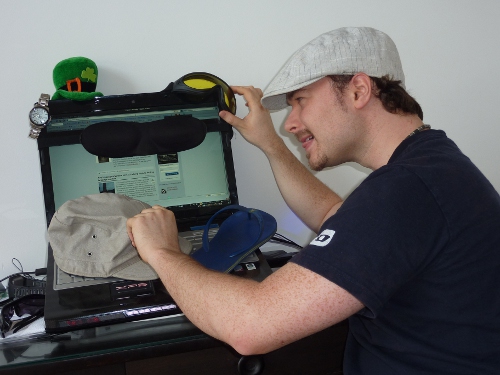The worst language learning advice you’ll ever receive

I get asked by people every day what the “secret” is to learning another language, and they don't seem satisfied with my answer of there is no secret; you need to work hard, speak often and early with people, make many mistakes and use it for real etc.
So you know what? The “truth” is that I have been hiding these secrets from you all this time! Today, I'll reveal the steps to take in that one true way to learn a language!
Buy buy buy!
The first and most important thing you need to do is to buy expensive language learning courses. If you are serious about learning this language then show it and put your money where your mouth is.
But how much do you spend? Well, did you know that price points on every language learning product is set at how good it is by a panel of impartial judges? It has nothing to do with marketers pushing their luck at how much money they can make and companies covering their extravagant advertising budgets so they can sell to as many suckers smart language learners as possible.
What this means is simple: the more expensive something is, the better it is. Guaranteed!
So you want to avoid something like a Lonely planet phrasebook. These cost about US$9 because they are only for poor language learners who don't care enough to spend real money. Definitely don't look at Teach Yourself or Colloquial courses either, as these cost only about twice that. Forget two figure pricetags and be looking at $300, ideally much more.
Of course, this means that big yellow boxes you find in airports should be the first thing you think about. If shipping is involved, that's fine – do not under any circumstances start working on your language until this wonderful course that will solve all your problems has arrived.
While waiting, bask in the glory of knowing that by clicking the buy button, you have taken the hardest step of all in language learning, and it's all smooth sailing from here!
Even better than this are academic courses priced at a grand and upwards, where you are in a classroom with several other people of many levels, letting the teacher do all the talking. If the teacher asks you to say anything during the class, transfer to another one immediately! You are paying them, so they should be doing all the work!
And finally, the best thing of all to pour your money into is a flight ticket! Being in the country actually has magic immersion powers that make the language naturally seep into you, while you sit on a beach sipping cocktails with your English speaking buddies!
It's all about grammar and vocabulary – don't speak until you're ready!
If you put your target language and your native language side by side, there are only two things that are different: grammar rules, and words that they have their own silly version of. (Yeah, I know – why can't they all just have some common sense and use English words!?)
Luckily though, these two things are all there is involved. Practice, exposure, experience, human interaction and all that other nonsense can be thrown aside!
What this means is that you must spend all your time involved in the language studying it – no time wasted doing things like speaking with people, or having fun with TV shows and comic books in the language. Study grammar tables, and study lists of vocabulary only.
The more expansive and random the subject of the vocabulary in the lists, the better, because you never know when you might be put on the spot to translate names of obscure animals or plants from the other side of the planet. Don't tailor these lists to words you are more likely to use – that's just silly!
Don't worry though – this will all be very easy!
The good thing about throwing money at the problem, is that your work is pretty much done! When you are deciding which course to buy, make sure that it emphasizes somewhere on its packaging that it is “the easy way” to learn a language! This is essential, because hard work of any kind is for losers.
The more that language learning involves clicking buttons, studying tables, doing exercises in stuff you find frustrating and boring, and the more complicated the presentation of that course's unique learning approach is, the better! Don't worry if it's boring though – the priority is that it's easy and that you don't feel like you are doing any real work. You will be smiling like the girl on the cover of your language course for the entire learning process!
These learning approaches have been scientifically proven to be efficient ways of learning in general – trust me, we've had Ivy League psychologists run these tests on monkeys learning how to stack boxes, so it is only logical that it applies to people specifically learning a second language!
Avoid native speakers at all costs – you will die of embarrassment
Because a language is just grammar and vocabulary differences, and nothing else is involved, do not under any circumstances use your language with another person… until you are ready.
You see, if you dare to speak your language before you have mastered it to perfection then people will stop in their tracks and all point and laugh at you in unison, and that's if you're lucky! A typical mistake is usually received by looks of shock and horror at you butchering their language, with scenes of fights breaking out and even death not being uncommon.
So yes, you will literally die of embarrassment for daring to speak in any early stage of learning!! Don't take that risk – be smart and keep your mouth shut at all times!
Do NOT meet up with someone in person from online searches, and do not go on a site like italki or Verbling for a free online language exchange – remember, if something is free, then it's for people who don't care enough! Also, who wants to see a look of disgust from a native speaker from you being so rude as to speak their language? (It will happen all the time without fail)
How ridiculous the mere idea; speaking a language to a native before you've mastered their language! It's pure insanity!!
Lucky for you, this is not a permanent stage. When that glorious ready day finally arrives, you will speak the language 100% perfectly and everyone will think you are a native speaker. But you absolutely must not muddy native speakers' ears with anything less than perfection before this day. Reaching this stage does not happen via practice – it's through lots of studying until the ready day when you make that quantum leap of instantly being ready!
In case you are wondering, the “ready day” comes when you have learned exactly 712,431 words and have put exactly 33,962 hours of study time in. (Not a single word or hour less, so track this very well!!) When you reach this glorious day, your work is done forever and everyone will think you are a native speaker 100% of the time. Until this time, listen your way to fluency!
Having any kind of an accent is a crime that frankly should be punishable by scorpion showers.
Other goals? I don't care, my way is the only way to learn
Now, what if you are more focused on reading literature well in the language, or passing an exam, or understanding lectures, or working professionally? Or if you enjoy learning languages for the love of it?
Well, I don't care – you see, this approach I have outlined is good for every and all goals in language learning without any alterations whatsoever. Trust me on this; I'm a language learning guru ninja hotshot Jedi.
I say that everyone should aim to sound like a native speaker all the time (including when scrutinized by phonologists playing your videos on Youtube in slow motion), and should be able to debate 16th century politics, or you are nothing but a worthless tourist.
Generic courses are designed specifically because they cover the one-true-way to learn a language, so if you veer off this path and try to be “independent”, you will crash and burn my friend. Don't follow a language learning path that looks more appropriate to you and your goals and interests – follow with the herd and you'll be good to go!
Oh yes and finally, to be on the safe side don't just invest in that one course – buy many. Many different competing products, large dictionaries, audio courses, software courses, little books, big books, advanced courses (so they can be on your shelf and ready to pounce on in several years' time without wasting a moment to go out and buy them) as well as courses at your own level. Buy it ALL. The bigger your collection, the more you will be confused for a native speaker! (Remember: that's the only important goal worth having!)
If in doubt, buy another course! Use as much of your free time as possible that you have set aside for learning the language to research the best software or books so that your collection is perfect.
This post was inspired by Nerdfitness, where my friend Steve Kamb has written The worst fitness advice you'll ever receive.



Social